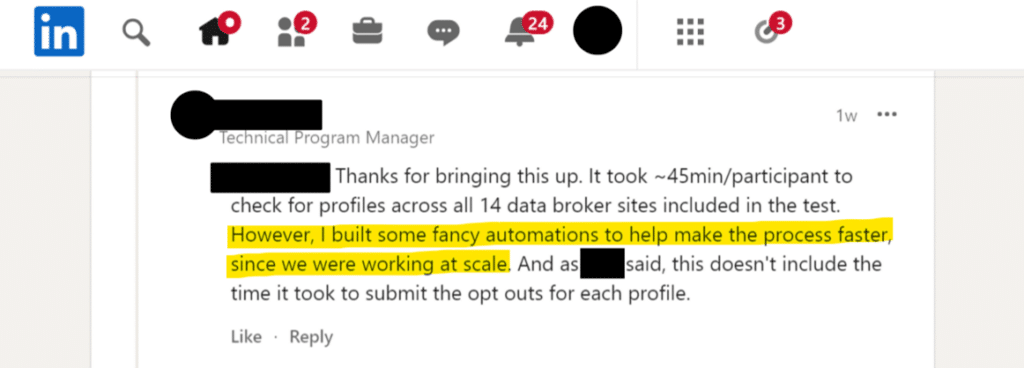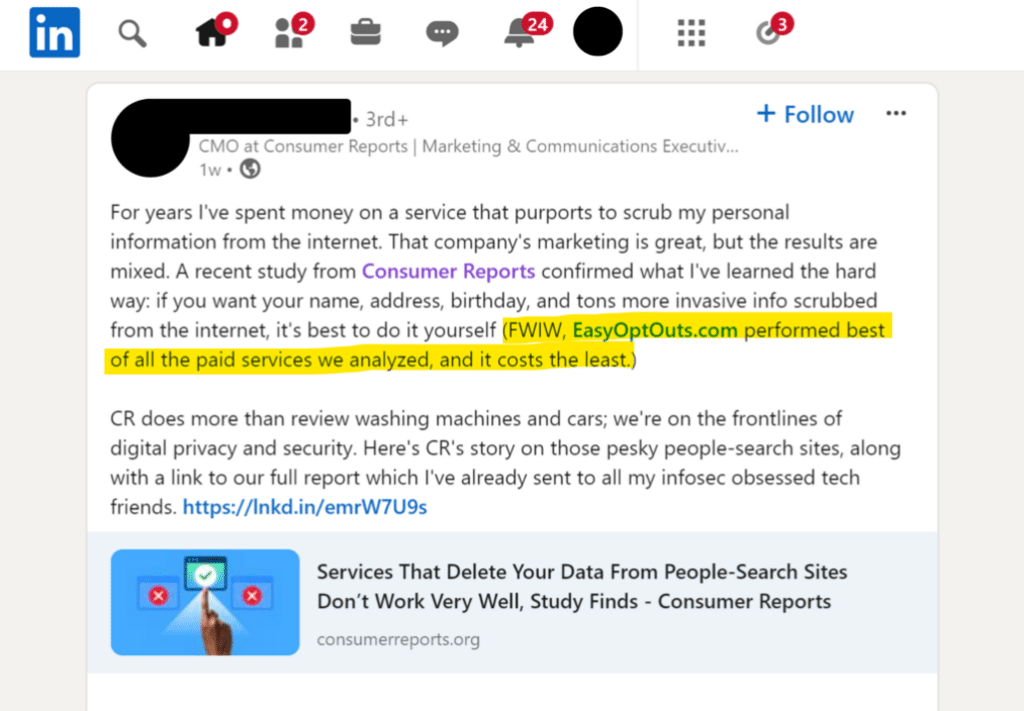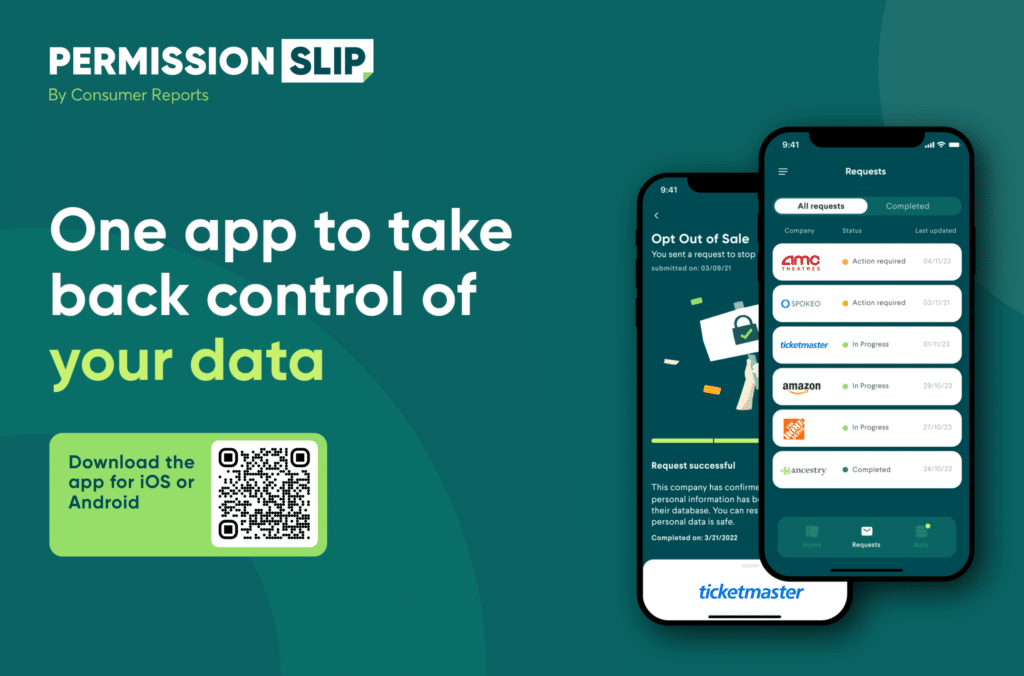On August 8, 2024, Consumer Reports published a report, press release, and blog post promoting the conclusions that people-search site removal services are “largely ineffective” and that “doing the work yourself is more effective” than any of the data removal services tested.
We felt the study was well intentioned, but poorly designed, misleading in its conclusions, and ultimately the source of misinformation as major news outlets picked up the story and amplified its flawed conclusions across the internet.
Despite the poor design, the results of the study ranked Optery the #1 most effective of all services tested, outperforming DeleteMe, Reputation Defender, EasyOptOuts, Kanary, and all others tested.
Consumer Reports Promoted a Conclusion That Was Not Even Tested
Consumer Reports promoted the conclusion that “doing the work yourself is more effective than all of them [the people-search site removal services tested]”. However, the study did not have regular consumers performing the opt-outs. Instead, it had highly trained data privacy professional(s) performing the opt-outs for the consumers. To quote the study, “we [Consumer Reports] manually opted out of the 13 people-search sites, to set a baseline for comparison”. Expert privacy researchers performing opt-outs in the context of a highly visible study is very different than regular people performing opt-outs in the context of their everyday lives, especially for regular people who are not tech-savvy.
If that weren’t enough, and even more incredibly, on LinkedIn, one of the three primary authors of the study revealed that “I built some fancy automations to help make the process faster, since we were working at scale” in response to a question about how long it took for the Consumer Reports team to perform the work manually. It’s quite a stretch to draw conclusions about everyday consumers performing opt outs manually, when your “baseline for comparison” includes “fancy automations” by highly trained technical privacy experts “working at scale”.

Additionally, the expert privacy researcher(s) not only performed the work for consumers, but they also checked their own work for accuracy, introducing yet another bias into the study.
The other important detail absent from the study is a realistic account of the time required to perform the opt-outs and ongoing checks manually. If we assume 6 hours initially and then another 2 hours every 4 months, that’s 12 hours per year. If you value your time at $25 per hour, that’s $300 of your time per year for just 13 data brokers. Any price less than $300 per year for more than 13 data brokers would appear to be money well-spent.
In addition to promoting a conclusion that was not even tested correctly, it’s important to reiterate that the study only tested 13 data brokers. Optery’s Ultimate plan currently covers 640+ data brokers, along with an unlimited number of data brokers via its Custom Removals feature. The near impossibility for most regular consumers to process hundreds of opt-outs manually is the very reason consumers use data removal services to begin with and is indeed one of the reasons Optery has become so popular.
It seems Consumer Reports would rather have you toiling manually through 640+ data broker opt-outs, than have you outsource the work at a reasonable cost to Optery. Time is money, and we’re sure you have much better things to do with your time!
The Study’s Design Ensured the Removal Services Performed at Their Worst
The study’s design significantly handicapped the data removal services from the start. The report said, “we provided the opt-out services with a limited amount of information” and, regarding the optional, but recommended features, “our participants did none of these things.”
Depriving the study participants of the optional, but recommended features such as adding a middle name or executing a limited power of attorney can severely impair results, and is not representative of how the services are used in the real world. For example, even though both are optional, approximately 80% of Optery customers add a middle name to their profile and utilize the limited power of attorney feature.
As the saying goes: Garbage in, garbage out.
Despite the significant handicap, Optery basically matched the effectiveness of the Consumer Reports researchers who were submitting their opt-outs by hand, with a removal rate of 68% by Optery vs. 70% for the expert privacy researcher(s). Had the Consumer Reports team fully utilized Optery as recommended, it’s highly likely the Optery results would have been far greater than those produced by hand.
Which Data Removal Service Performed Best?
At the conclusion of the study, Optery performed the best. That is clear.
Optery performed 3 percentage points better than runner-up EasyOptOuts, and a whopping 41 percentage points better than marketing powerhouse DeleteMe.
| People-Search Removal Service | Annual Cost (as of July 2024) | Profiles Removed Within a Week | Profiles Removed Within 1 Month | Profiles Removed Within 4 Months |
|---|---|---|---|---|
| Optery (Ultimate Tier) | $249 | 52% | 58% | 68% |
| EasyOptOuts | $19.99 | 59% | 61% | 65% |
| IDX (Privacy Tier) | $139.92 | 38% | 38% | 40% |
| Kanary | $179.88 | 16% | 26% | 34% |
| DeleteMe | $129 | 13% | 20% | 27% |
| Reputation Defender (Privacy Pro) | $99 | 2% | 4% | 6% |
| Confidently | $120 | 0% | 2% | 4% |
But Consumer Reports did not seem to want this to be the case. In its commentary, Consumer Reports repeatedly highlighted EasyOptOuts first and Optery second, as you can see in the screenshot from their blog post below.

Furthermore, the Consumer Reports Chief Marketing Officer posted to LinkedIn that EasyOptOuts “performed best of all the paid services we analyzed”, neglecting to provide any credit whatsoever to Optery, when in fact Optery was the most effective people-search site removal service by the end of the study.

We have no idea why Consumer Reports snubbed Optery in this way.
The Consumer Reports commentary also incorrectly suggests Optery and EasyOptOuts are comparable in effectiveness. We have nothing negative to say about EasyOptOuts, but EasyOptOuts only covers a fraction of the data brokers Optery covers, and only offers a fraction of the features Optery offers. Naturally, we do not believe the two services are as comparable as Consumer Reports suggests.
What’s important to reiterate is that EasyOptOuts performed almost as good as Optery, only for the 13 data brokers tested. Had the study tested 500+ data brokers, performing comparably with Optery would have been almost impossible for any other service. Optery Exposure Reports regularly find 50+ exposed profiles that the other data removal services have missed.
In its zeal to promote a low-cost alternative, it seems Consumer Reports lost the forest for the trees and conflated their project’s conclusions with applicability to the real world where there are hundreds more than the 13 data brokers they tested.
What Did Consumer Reports Get Right?
Despite the significant problems with the study, there are a few threads of truth in the Consumer Reports commentary.
The first thread of truth is that, although the Consumer Reports results were not statistically significant, they do directionally agree with what we see in practice, which is that removals quality varies dramatically across service providers, that Optery produces the highest removals success rates of any of the services we have tested ourselves against, and that many services have barely any effect at all.
The second thread of truth is that getting your data removed from data brokers comprehensively is really hard. The vast majority of Optery customers are extremely pleased with their results, but no data removal service can be 100% effective. This is why we are strong advocates of a federal Delete Act with provisions for Authorized Agents, similar to what was passed in California in 2023. This is our best chance for a leap forward in data privacy control for consumers.
The third thread of truth is that some data removal companies are over-promising and under-delivering when marketing their services.
To illustrate this point, we assembled a few frames from a DeleteMe advertisement currently running across the Facebook, Instagram and Messenger ad networks in the animated GIF below. Our unofficial internal estimates indicate this advertisement has delivered millions of ad impressions promoting claims that DeleteMe is “scraping 750+ sites”, and that if your data appears, DeleteMe will “take it down instantly”. We’ll let you be the judge of whether or not you think the claims in this advertisement are true.
More detail on how Optery compares to DeleteMe can be found in our DeleteMe vs. Optery Review.
In Conclusion
The ultimate irony here is that consumers have now been twice misled.
First by some data broker removal services over-promising and under-delivering on the effectiveness of their services through questionable marketing and advertising tactics. And now by Consumer Reports leading consumers to believe that this flawed study showed people-search site removal services are “largely ineffective” and that “doing the work yourself is more effective” than automated technology like Optery.
Our team works tirelessly for our customers, taking very seriously the trust you’ve placed in us and always striving to lead the way in data removal effectiveness.
Appendix 1: The Commentary Was Biased Against Data Removal Services from the Start
Even though data removal services have removed hundreds of millions of pieces of unwanted data for hundreds of thousands of happy customers, and have saved consumers millions of hours of time and frustration, Consumer Reports had nothing positive to say about them. Data removal services are also advocating to improve federal privacy laws for consumers, as was reported in The Record. For example, Optery and several of the companies evaluated in the Consumer Reports study signed this letter to members of the U.S. House Committee on Energy & Commerce advocating for stronger data broker provisions in a proposed federal privacy law. But you’d never know any of this from the Consumer Reports commentary.
Instead, the commentary had a negative slant to it, choosing not to highlight any of the positives.
Paradoxically, this Consumer Reports story was a big win for data brokers. Data brokers are throwing significant resources into discrediting and undermining data broker removal services, and this Consumer Reports story played right into their hands.
Appendix 2: In Apparent Conflict of Interest, Consumer Reports Chose Not to Evaluate its Own Competing Product, But Then Used The Marketing of the Study to Promote It
Consumer Reports offers a competing data removal service named Permission Slip, yet Consumer Reports chose not to evaluate it in the study.

After casting doubt on the effectiveness and motivations of many of Permission Slip’s rivals, Consumer Reports used the opportunity to promote their own competing product. The last paragraph of the press release and blog post are quoted below, with very similar descriptions to how people-search site removal services market themselves:
“CR has also developed technical solutions to empower people to take control of their data. Permission Slip is a free app that helps individuals learn about the data collected on them and stop companies from collecting it.”
“Take advantage of CR’s two free tools designed to help consumers control their data. Permission Slip is a free app that helps you learn what companies are collecting data on you and, if you choose, easily tell them to delete it.”
First providing the Consumer Reports Permission Slip product with a free pass on the evaluation, and then using the study’s marketing to promote it? Seems like a conflict of interest to us.
